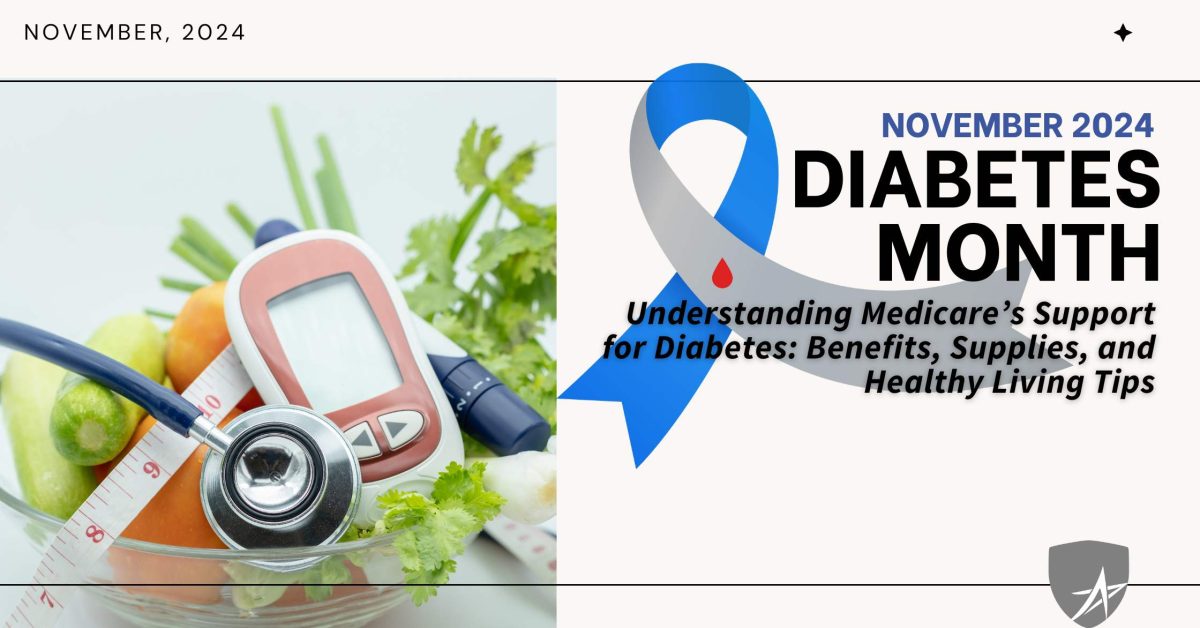Over 37 million Americans are living with diabetes, and nearly half of them are over the age of 65. For seniors, managing diabetes is crucial, and Medicare plays a key role in providing access to life-saving supplies and treatments.
November is American Diabetes Month, a time to raise awareness about diabetes, its risk factors, and how to manage it. For Medicare beneficiaries, understanding diabetes and how Medicare helps cover treatment is especially important.
What is Diabetes?
Diabetes is a condition where your body has trouble controlling blood sugar (glucose) levels. There are two main types:
- Type 1 Diabetes: The body doesn’t make insulin, which is needed to help glucose get into your cells.
- Type 2 Diabetes: The body doesn’t use insulin well, leading to high blood sugar levels. This is the most common type, especially among older adults.
Uncontrolled diabetes can cause serious health problems like heart disease, nerve damage, kidney issues, and vision loss.
Stay Informed About Family Health History
Genetics can play a significant role in the risk of developing diabetes. If one of your parents has Type 2 diabetes, your chances of developing the condition are about 40%. If both parents are affected, your risk increases to around 70%. While genetics can increase susceptibility, lifestyle factors like diet and exercise also play a critical role in managing or even preventing diabetes.
Understanding your family health history is an essential step in diabetes prevention and management. Talk to your doctor about your risk and use your Medicare benefits, such as diabetes screenings and self-management training, to stay ahead of potential health issues.
What Does Medicare Cover for Diabetes?
If you have diabetes or are at risk, Medicare offers coverage for many services:
- Diabetes Screenings: If you’re at risk, Medicare covers screenings to detect diabetes early.
- Diabetes Supplies: Medicare Part B helps cover glucose monitors, test strips, lancets, and insulin pumps if you need them.
- Self-Management Training: Medicare may cover training to help you manage diabetes, including advice on diet and exercise.
- Medical Nutrition Therapy: Medicare covers services with a dietitian to help you manage your condition through proper nutrition.
- Foot Exams and Eye Screenings: Because diabetes can affect your feet and eyes, Medicare covers these important exams.
Medicare Annual Wellness Visits
If you’re a Medicare beneficiary, you’re entitled to an annual wellness visit. This visit is an important opportunity to discuss your diabetes risk with your healthcare provider, review your current diabetes care plan, and receive any necessary screenings or updates to your treatment. Regular check-ups with your doctor, monitoring your condition, and staying on top of screenings and treatments can help prevent complications and ensure you’re on the right path to managing your health.
Managing Diabetes
Managing diabetes involves keeping your blood sugar levels within a healthy range. Here are some essential steps to help you manage your diabetes:
- Eat Healthy: Focus on a balanced diet with vegetables, whole grains, lean proteins, and limited sugary foods. Proper portion control is also key to maintaining healthy blood sugar levels.
- Be Active: Aim for at least 30 minutes of physical activity most days of the week. Even light activities like walking, swimming, or gardening can make a significant difference in your overall health.
- Take Medications as Prescribed: If prescribed insulin or other diabetes medications, make sure to take them as directed by your healthcare provider.
- Monitor Your Blood Sugar: Regular blood sugar checks are essential for managing your condition effectively. Keep track of your results and share them with your doctor to make any necessary adjustments to your care plan.
Maximize Your Medicare Coverage This AEP
If you or a loved one has diabetes, it’s crucial to take full advantage of your Medicare benefits for treatments, supplies, and services. With just a week left in the Annual Enrollment Period (AEP), now is the time to review your coverage. We are here to ensure you have the support you need and the most suitable plan in place. Contact us today to get on our schedule so that you can make any necessary changes before time runs out.
Centers for Disease Control and Prevention (CDC). National Diabetes Statistics Report, 2022. Available at:
https://www.cdc.gov/diabetes/php/data-research/methods.html?CDC_AAref_Val=https://www.cdc.gov/diabetes/data/statistics-report/index.html

